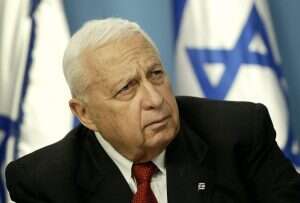Two weeks after the 2005 disengagement from the Gaza Strip and the eviction and destruction of the settlements in Gush Katif, then-Deputy Prime Minister Ehud Olmert informed then-Prime Minister Ariel Sharon that he intended to present then-US Secretary of State Condoleezza Rice with the notion that the disengagement from Gaza was merely the prelude to a similar move in Judea and Samaria.
Speaking with Israel Hayom, Olmert said that Sharon disliked the idea, but did not stop him from presenting it to Rice. Olmert briefed Sharon on the meeting when he returned from the United States.
Follow Israel Hayom on Facebook and Twitter
Sharon, it appears, discussed with his confidants the possibility of pursuing a disengagement move in Judea and Samaria in the event that the plan known as the "Roadmap for Peace" failed and the Israeli-Palestinian peace process would deadlock.
The discussions never went beyond a theoretical plan, but nevertheless, in late 2005, not long before Sharon suffered the stroke that rendered him comatose, he and then-Justice Minister Tzipi Livni appointed a panel to review the matter.

Headed by then-Justice Ministry Director General Aharon Abramovich, the forum included, among others, then-Deputy IDF Chief of Staff Maj. Gen. Moshe Kaplinsky, and then-Deputy Attorney General for International Affairs Shavit Matias. They were asked to outline the security, economic, diplomatic, and legal framework of a disengagement move in Judea and Samaria, based on the lessons learned from the Gaza withdrawal.
Named the prime minister in the wake of Sharon's grave illness, Olmert presented the so-called "realignment plan," which would have seen Israel unilaterally withdraw from vast areas in Judea and Samaria.
Attorney Dov Weisglass, who was Prime Minister Sharon's bureau chief, said, "While the disengagement from Gaza was an independent move, it was meant to eventually fit in with another move, based on the road map, in an effort to avoid a deadlock [in the negotiations].
"The idea was to pursue a similar move in the West Bank," Weisglass acknowledged, adding that events unfolded "like a move that suffered a power outage."
Dennis Ross, who served as Director of Policy Planning and Chief Coordinator of the Middle East negotiations in three US administrations, told Israel Hayom that PM Sharon "clearly planned an additional withdrawal in the West Bank. There was no need to create Kadima if he did not plan a further withdrawal.
"I [point to] the history of his creating [the] Likud after he retired from the military. It was not a small decision for him to leave the party he forged and start a new one, but he knew after Gaza, Likud would oppose any further withdrawals."
Sharon, he added, "was convinced that the only way to preserve what Israel needed long-term in the West Bank and ensure Israel would not become a binational state was to carry out a limited further withdrawal."
Subscribe to Israel Hayom's daily newsletter and never miss our top stories!




